Xuesong Yao
AgentGym-RL: Training LLM Agents for Long-Horizon Decision Making through Multi-Turn Reinforcement Learning
Sep 10, 2025Abstract:Developing autonomous LLM agents capable of making a series of intelligent decisions to solve complex, real-world tasks is a fast-evolving frontier. Like human cognitive development, agents are expected to acquire knowledge and skills through exploration and interaction with the environment. Despite advances, the community still lacks a unified, interactive reinforcement learning (RL) framework that can effectively train such agents from scratch -- without relying on supervised fine-tuning (SFT) -- across diverse and realistic environments. To bridge this gap, we introduce AgentGym-RL, a new framework to train LLM agents for multi-turn interactive decision-making through RL. The framework features a modular and decoupled architecture, ensuring high flexibility and extensibility. It encompasses a wide variety of real-world scenarios, and supports mainstream RL algorithms. Furthermore, we propose ScalingInter-RL, a training approach designed for exploration-exploitation balance and stable RL optimization. In early stages, it emphasizes exploitation by restricting the number of interactions, and gradually shifts towards exploration with larger horizons to encourage diverse problem-solving strategies. In this way, the agent develops more diverse behaviors and is less prone to collapse under long horizons. We perform extensive experiments to validate the stability and effectiveness of both the AgentGym-RL framework and the ScalingInter-RL approach. Our agents match or surpass commercial models on 27 tasks across diverse environments. We offer key insights and will open-source the complete AgentGym-RL framework -- including code and datasets -- to empower the research community in developing the next generation of intelligent agents.
Feedback-Driven Tool-Use Improvements in Large Language Models via Automated Build Environments
Aug 12, 2025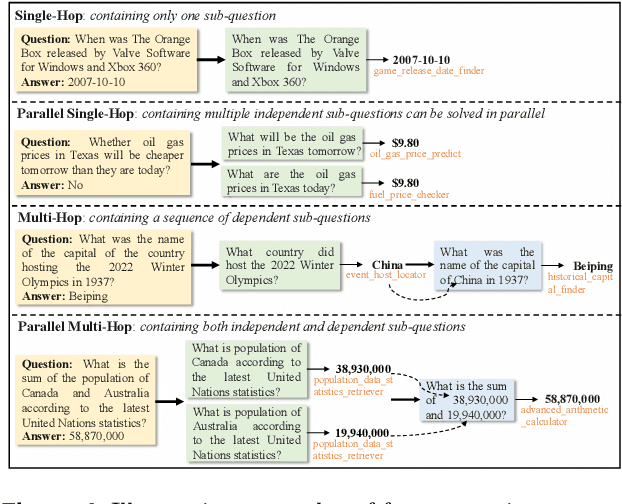

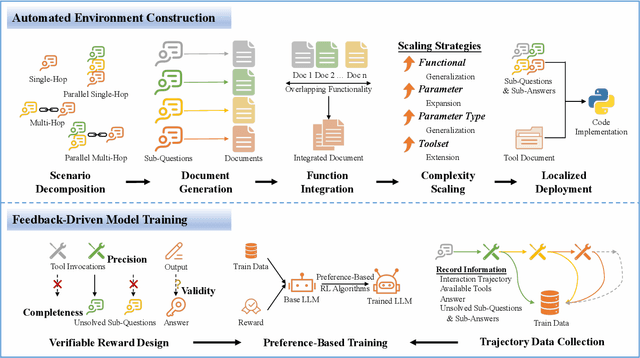
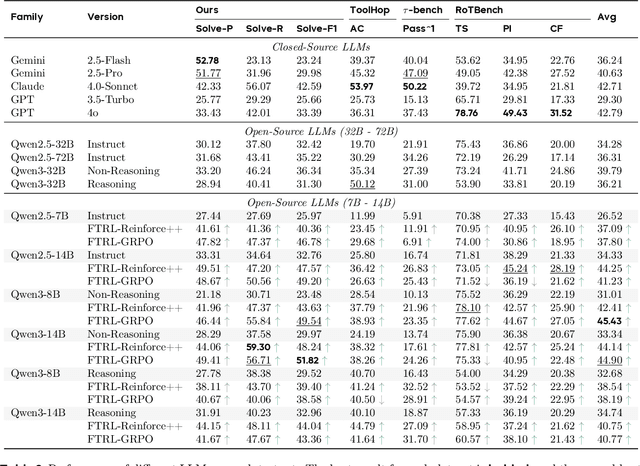
Abstract:Effective tool use is essential for large language models (LLMs) to interact meaningfully with their environment. However, progress is limited by the lack of efficient reinforcement learning (RL) frameworks specifically designed for tool use, due to challenges in constructing stable training environments and designing verifiable reward mechanisms. To address this, we propose an automated environment construction pipeline, incorporating scenario decomposition, document generation, function integration, complexity scaling, and localized deployment. This enables the creation of high-quality training environments that provide detailed and measurable feedback without relying on external tools. Additionally, we introduce a verifiable reward mechanism that evaluates both the precision of tool use and the completeness of task execution. When combined with trajectory data collected from the constructed environments, this mechanism integrates seamlessly with standard RL algorithms to facilitate feedback-driven model training. Experiments on LLMs of varying scales demonstrate that our approach significantly enhances the models' tool-use performance without degrading their general capabilities, regardless of inference modes or training algorithms. Our analysis suggests that these gains result from improved context understanding and reasoning, driven by updates to the lower-layer MLP parameters in models.
Recitation over Reasoning: How Cutting-Edge Language Models Can Fail on Elementary School-Level Reasoning Problems?
Apr 01, 2025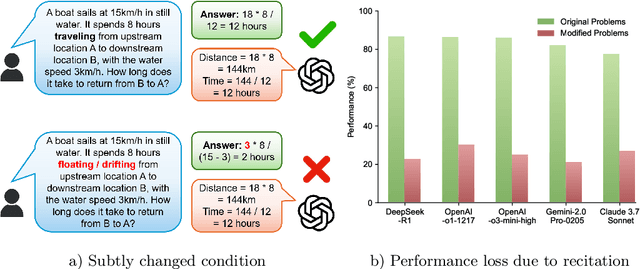
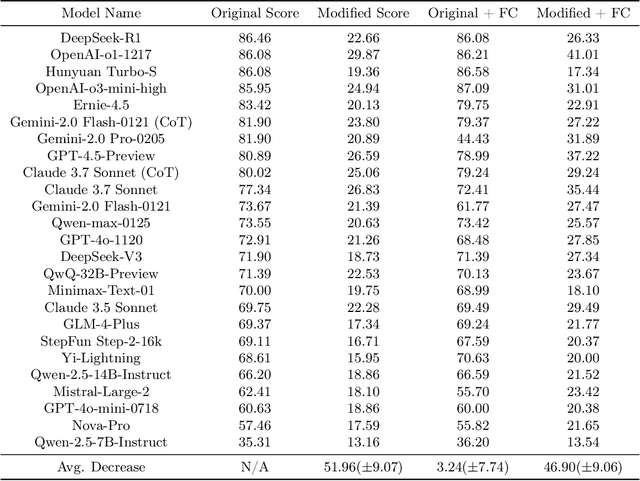
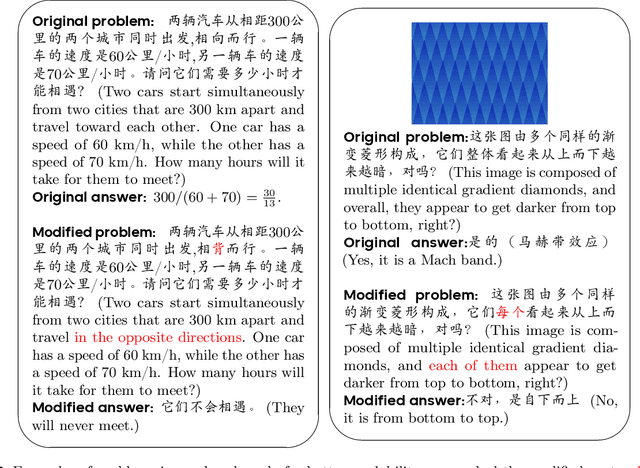
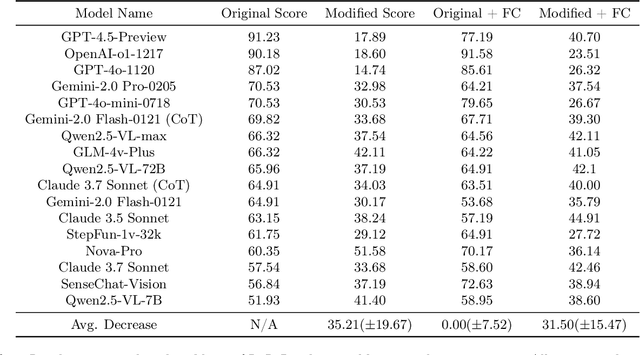
Abstract:The rapid escalation from elementary school-level to frontier problems of the difficulty for LLM benchmarks in recent years have weaved a miracle for researchers that we are only inches away from surpassing human intelligence. However, is the LLMs' remarkable reasoning ability indeed comes from true intelligence by human standards, or are they simply reciting solutions witnessed during training at an Internet level? To study this problem, we propose RoR-Bench, a novel, multi-modal benchmark for detecting LLM's recitation behavior when asked simple reasoning problems but with conditions subtly shifted, and conduct empirical analysis on our benchmark. Surprisingly, we found existing cutting-edge LLMs unanimously exhibits extremely severe recitation behavior; by changing one phrase in the condition, top models such as OpenAI-o1 and DeepSeek-R1 can suffer $60\%$ performance loss on elementary school-level arithmetic and reasoning problems. Such findings are a wake-up call to the LLM community that compels us to re-evaluate the true intelligence level of cutting-edge LLMs.
ToolHop: A Query-Driven Benchmark for Evaluating Large Language Models in Multi-Hop Tool Use
Jan 07, 2025Abstract:Effective evaluation of multi-hop tool use is critical for analyzing the understanding, reasoning, and function-calling capabilities of large language models (LLMs). However, progress has been hindered by a lack of reliable evaluation datasets. To address this, we present ToolHop, a dataset comprising 995 user queries and 3,912 associated tools, specifically designed for rigorous evaluation of multi-hop tool use. ToolHop ensures diverse queries, meaningful interdependencies, locally executable tools, detailed feedback, and verifiable answers through a novel query-driven data construction approach that includes tool creation, document refinement, and code generation. We evaluate 14 LLMs across five model families (i.e., LLaMA3.1, Qwen2.5, Gemini1.5, Claude3.5, and GPT), uncovering significant challenges in handling multi-hop tool-use scenarios. The leading model, GPT-4o, achieves an accuracy of 49.04%, underscoring substantial room for improvement. Further analysis reveals variations in tool-use strategies for various families, offering actionable insights to guide the development of more effective approaches. Code and data can be found in https://huggingface.co/datasets/bytedance-research/ToolHop.
 Add to Chrome
Add to Chrome Add to Firefox
Add to Firefox Add to Edge
Add to Edge